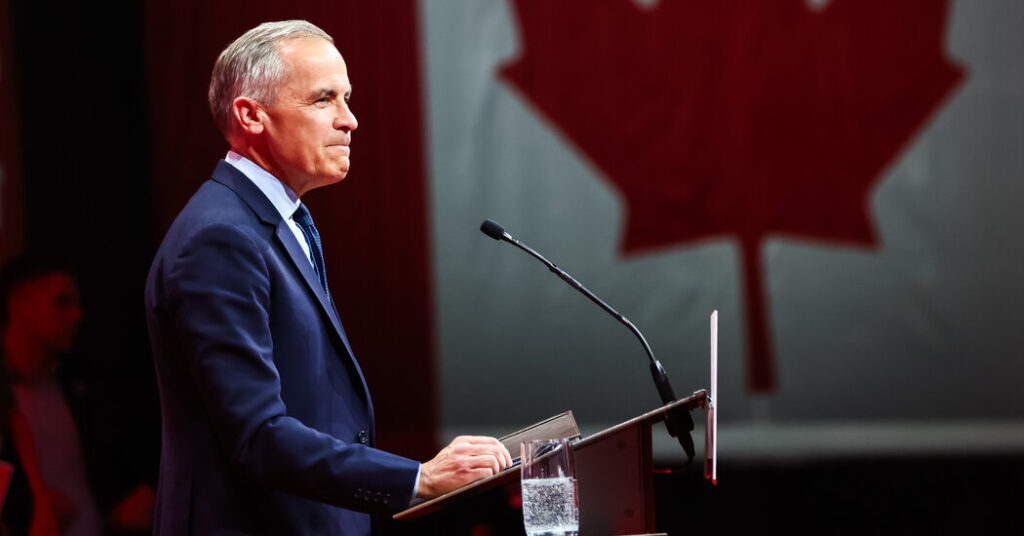Canada’s former banker, now prime minister, executed an astonishing political comeback, transforming his party from a dire polling situation to winning an uncommon fourth term in office, and achieving the highest government position just three months after entering the political arena.
Mark Carney, the newly elected leader, assured Canadians of his capability to confront President Trump and emphasized his economic knowledge to rejuvenate the struggling economy while protecting it during challenging times.
However, he must act quickly as the country transitions from a long stretch of political instability and deals with the repercussions of a trade war with its nearest ally and economic partner, the United States.
Domestic Challenges
Mr. Carney saw an unexpected opportunity when his predecessor, Justin Trudeau, announced in January his decision to step down after a decade in power.
Upon winning the race to succeed Mr. Trudeau as prime minister and head of the Liberal Party in March, Mr. Carney took on a challenging domestic situation that requires urgent attention.
The Canadian Parliament has been inactive since before Christmas, following Mr. Trudeau’s suspension of its operations to facilitate the process of electing Mr. Carney as the Liberal leader.
As a result, the nation has faced months of political uncertainty, unable to advance any legislative initiatives.
Moreover, Mr. Carney has yet to establish his cabinet—he has made minor adjustments to the team he inherited, but he is expected to appoint top ministers soon following his electoral victory.
Mr. Carney needs to act decisively to gain essential parliamentary support and maintain his party’s stability, while avoiding the risk of a no-confidence vote that could lead to new elections.
“The priority is forming a cabinet and reconvening Parliament as soon as possible,” said Matthew Holmes, a senior executive at the Canadian Chambers of Commerce. “We need the prime minister to quickly engage in legislative work.”
“This prime minister doesn’t have a honeymoon period,” Mr. Holmes added.
Focus on Stability
One of Mr. Carney’s successful campaign messages was that he is the ideal leader to steer Canada through the changes in global trade and security instigated by President Trump.
His experience leading significant institutions during turbulent times, such as guiding the Bank of England through Brexit, helped convince many Canadians that he has the right skills for the challenges ahead.
Canadian businesses expect Mr. Carney to bring some order back to trade with the U.S. The fluctuating tariffs imposed by President Trump on Canadian goods have created uncertainty, leaving businesses hesitant to invest. Mr. Holmes emphasized that Mr. Carney needs to act on this matter swiftly.
“Investment is frozen, as businesses are waiting to see how the trade war unfolds,” Mr. Holmes stated. “He needs to restore certainty.”
Opposition to Trump
By framing his campaign around President Trump’s threats to Canada, Mr. Carney has emerged as a prominent figure opposing Trump. He is the first major leader to be elected on a distinctly anti-Trump platform since the former president’s re-election.
“As I have warned for months, America covets our land, resources, and water,” Mr. Carney told supporters in Ottawa in the early hours following his victory. “Trump is attempting to undermine us so he can control us. That will never happen,” he asserted as the crowd reacted with boos.
Later that day, Mr. Carney spoke with Mr. Trump, and both agreed to meet soon.
However, Mr. Carney’s sharp rhetoric could pose a challenge if the two leaders meet in person. While Mr. Carney wants to earn Trump’s respect, he is also open to discussing the future of their nations’ relationship on trade and security.
“There is a desire in the West for an anti-Trump leader to emerge as the representative of the free world,” said Stephen Wertheim, a senior fellow at the Carnegie Endowment for International Peace. “However, that could be a risky endeavor.”
“When the media portrays a foreign leader as a resistance figure against Trump, it can make them a target,” he added.
Mr. Carney will likely adopt a more diplomatic approach with Mr. Trump privately, while the Canadian public will expect the defiance and pride he exhibited during his campaign.
The reality remains that the U.S. has imposed tariffs on crucial Canadian sectors such as the automotive industry, and Mr. Trump has repeatedly suggested he sees Canada as a potential 51st state, even on the day of Canada’s elections.
Mr. Wertheim advised that Mr. Carney should be cautious about the threats and concentrate on negotiating deals. “Carney shouldn’t dwell too much on the annexation talk,” he said. “If Trump mentions it, it might just be a joke; Carney should respond with humor.”
Hosting the G7
An initial challenge for Mr. Carney will be managing relations with Mr. Trump when he hosts the G7 summit in Kananaskis, Alberta, in June.
Mr. Trump is expected to attend and will find himself alongside America’s closest allies, all of whom have faced U.S. tariffs.
Conversely, Mr. Carney will be with familiar faces in his own region. He has a good rapport with French President Emmanuel Macron and British Prime Minister Keir Starmer and is seeking to negotiate a military funding agreement with Ursula von der Leyen, the head of the EU.
It’s uncertain what, if anything, will be decided at the summit, as such gatherings typically focus on higher-level policy coordination rather than concrete outcomes.
Nevertheless, there is minimal room for mistakes. The last G7 summit Mr. Trump attended in Canada ended poorly, with a fallout between him and Mr. Trudeau, resulting in Mr. Trump leaving without signing a common statement and later labeling Mr. Trudeau as “two-faced.”
Mr. Carney must meticulously plan the event to avoid any awkward moments.
“The June G7 summit will significantly influence the early assessment of his leadership,” Mr. Holmes noted. “This is what he campaigned on, claiming he can manage a complex geopolitical landscape.”


